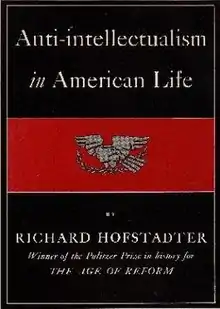Anti-intellectualism in American Life
Anti-intellectualism in American Life is a book by Richard Hofstadter published in 1963 that won the 1964 Pulitzer Prize for General Non-Fiction.[1][2]
 First edition | |
| Author | Richard Hofstadter |
|---|---|
| Country | United States |
| Subject | Intellectualism |
| Publisher | Knopf |
Publication date | 1963 |
| Pages | 434 |
| Awards | Pulitzer Prize for General Non-Fiction (1964) |
| OCLC | 227012080 |
Summary
In this book, Hofstadter set out to trace the social movements that altered the role of intellect in American society.[3] In so doing, he explored questions regarding the purpose of education and whether the democratization of education altered that purpose and reshaped its form.[4]
Analysis
In considering the historic tension between access to education and excellence in education, Hofstadter argued that both anti-intellectualism and utilitarianism were consequences, in part, of the democratization of knowledge. Moreover, he saw these themes as historically embedded in America's national fabric, an outcome of its colonial European and evangelical Protestant heritage. He contended that American Protestantism's anti-intellectual tradition valued the spirit over intellectual rigour.[5]
Definition
Hofstadter described anti-intellectualism as “resentment of the life of the mind, and those who are considered to represent it; and a disposition to constantly minimize the value of that life.”[6]
Also, he described the term as a view that "intellectuals...are pretentious, conceited... and snobbish; and very likely immoral, dangerous, and subversive ... The plain sense of the common man is an altogether adequate substitute for, if not actually much superior to, formal knowledge and expertise."[7]
References
- De Simone, Deborah M. "The Consequences of Democratizing Knowledge: Reconsidering Richard Hofstadter and the History of Education." The History Teacher. Vol. 34, No. 3 (May 2001).
- Lemann, Nicholas. "The Tea Party is timeless." Columbia Journalism Review Online edition: September 2, 2014. — This story was published in the September/October 2014 issue of CJR with the headline, "The American way."
- Richard Hofstadter: Anti-Intellectualism in American Life, The Paranoid Style in American Politics, Uncollected Essays 1956-1965|Library of America
- Anti-intellectualism is back — because it never went away. And it's killing Americans|Salon.com
- Shields, Jon A. (2009-02-02). The Democratic Virtues of the Christian Right. ISBN 1400830109.
- Richard Hofstadter and America's New Wave of Anti-Intellectualism - The Daily Beast
- Many Americans deeply distrust experts. So will they ignore the warnings about coronavirus? - The Washington Post
External links
- Anti-intellectualism in American Life at Open Library

- Cook, Ramsay (Winter 1963–1964). "Review of Anti-Intellectualism in American Life by Richard Hofstadter". International Journal. 19 (1): 98–99. doi:10.2307/40198709. JSTOR 40198709.CS1 maint: ref=harv (link)